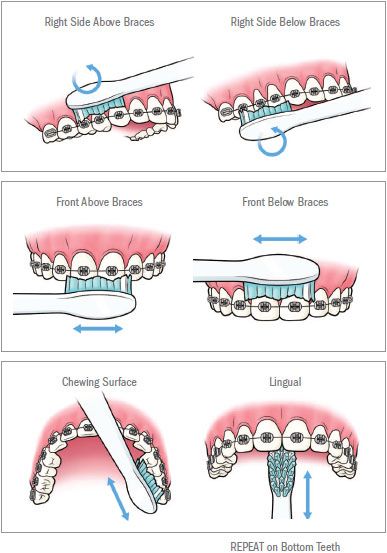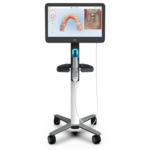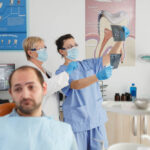Maintaining oral health during orthodontic treatment is crucial for ensuring the success of the treatment and the overall health of the patient. Orthodontic treatment involves the use of braces, aligners, or other appliances to correct misaligned teeth and jaws, improving both the appearance and function of the smile. However, the presence of these devices can make it challenging to maintain proper oral hygiene, leading to potential issues such as tooth decay, gum disease, and bad breath.
One unique fact to consider is that orthodontic treatment can have a significant impact on oral health. The brackets, wires, and other components of braces or aligners create small spaces that can trap food particles and make it difficult to clean the teeth thoroughly. Additionally, the pressure exerted by these appliances can cause the gums to become inflamed or irritated. Therefore, special attention and care must be given to oral hygiene practices during orthodontic treatment.
In the next part of this article, we will discuss some essential tips and tricks for maintaining oral health during orthodontic treatment. These key takeaways will offer practical advice on brushing and flossing techniques, selecting appropriate dental products, and adopting habits that promote oral hygiene. By following these tips, orthodontic patients can optimize the effectiveness of their treatment while safeguarding their dental health.
What you should know
1. Proper oral hygiene is crucial during orthodontic treatment, as braces can trap food particles and make it difficult to clean teeth effectively. Brushing after every meal and using interdental brushes or floss threaders can help remove plaque and prevent cavities.
2. Maintaining a healthy diet is essential for oral health while wearing braces. Avoiding sticky and hard foods can prevent damage to brackets and wires, while incorporating vitamin-rich and low-acid foods can promote strong teeth and gums.
3. Using orthodontic wax and silicone bumpers can alleviate discomfort or irritation caused by braces. Applying wax to any protruding wires or sharp edges can provide a cushioning effect, while silicone bumpers can create a protective barrier between the brackets and the inside of the mouth.
4. Regular dental check-ups are necessary during orthodontic treatment to monitor oral health and identify any issues early on. Dentists can adjust or repair braces, clean teeth thoroughly, and provide guidance on maintaining good oral hygiene throughout the treatment process.
5. Wearing a mouthguard during physical activities or sports is essential for protecting teeth and braces from potential injuries. Custom-fit mouthguards are recommended to ensure maximum comfort and effectiveness, reducing the risk of breakage or damage to braces.
How can one maintain oral health during orthodontic treatment?
The key to maintaining oral health during orthodontic treatment is through proper oral hygiene practices and regular dental check-ups. Orthodontic treatment, such as wearing braces or aligners, can make it more challenging to keep the teeth and gums clean. However, with the right techniques and habits, it is possible to prevent oral health issues and achieve a healthy smile. Here are some tips and tricks to help you maintain oral health during orthodontic treatment. For expert guidance and personalized care, consider visiting Dr. Reynolds’ practice.
Brushing and flossing with braces
Brushing and flossing become even more important when you have braces. Food particles and plaque can easily get trapped in the brackets and wires, leading to tooth decay and gum problems. It is recommended to brush your teeth after every meal or at least three times a day. Use a soft-bristle toothbrush and fluoride toothpaste to gently clean all surfaces of your teeth, including around the brackets and wires. Flossing should also be done daily using special orthodontic floss or floss threaders to reach between the teeth and under the wires.
Additionally, using an interdental brush or a water flosser can help remove any remaining food particles and plaque. These tools can reach areas that regular brushing and flossing may miss. It is important to be thorough and spend enough time cleaning your teeth to ensure optimal oral health during orthodontic treatment.
Watch your diet
During orthodontic treatment, it is crucial to be mindful of your diet to prevent damage to your braces and maintain oral health. Avoid hard, sticky, and chewy foods that can cause brackets or wires to break. These include popcorn, nuts, chewing gum, and hard candies. Opt for softer foods that are easier to chew, such as cooked vegetables, yogurt, and lean meats. It is also important to limit sugary and acidic foods and beverages, as they can increase the risk of tooth decay and enamel erosion. Drinking plenty of water throughout the day can help wash away food particles and maintain saliva production, which is essential for oral health.
Regular dental check-ups are crucial during orthodontic treatment. Your orthodontist will schedule regular appointments to adjust your braces or aligners, but it is also important to continue seeing your dentist for routine check-ups and cleanings. Your dentist can monitor your oral health, identify any issues early on, and provide professional cleanings to remove stubborn plaque and tartar. They can also offer additional tips and advice specific to your orthodontic treatment to ensure optimal oral health.
Additional tips and alternatives
Here are some additional tips and alternatives to consider for maintaining oral health during orthodontic treatment:
1. Use a mouthwash: Incorporating an antimicrobial mouthwash into your oral hygiene routine can help kill bacteria and freshen your breath.
2. Consider orthodontic alternatives: If you are concerned about maintaining oral health during traditional braces treatment, you may want to explore alternatives such as clear aligners, which are removable and make oral hygiene easier.
3. Use a fluoride mouth rinse: Your dentist may recommend using a fluoride mouth rinse to strengthen your teeth and prevent tooth decay.
4. Wear a mouthguard: If you participate in sports or other physical activities, wearing a mouthguard can protect your teeth and braces from potential injuries.
Remember, maintaining oral health during orthodontic treatment requires dedication and consistent effort. By following these tips and tricks, you can ensure that your teeth and gums stay healthy throughout your orthodontic journey, ultimately achieving a beautiful and confident smile.
FAQs about Maintaining Oral Health During Orthodontic Treatment: Tips and Tricks
1. How can I maintain good oral hygiene while wearing braces?
While wearing braces, it is crucial to maintain good oral hygiene to prevent any oral health issues. Brush your teeth thoroughly after every meal using a soft-bristle toothbrush and fluoride toothpaste. Pay extra attention to cleaning around the brackets and wires. Flossing is also essential, and you can use special orthodontic floss or a floss threader to clean between the teeth and under the wires. Additionally, using an antimicrobial mouthwash can help kill bacteria and reduce the risk of gum disease.
2. Are there any specific foods I should avoid during orthodontic treatment?
Yes, there are certain foods you should avoid to prevent damage to your braces. Hard and sticky foods, such as popcorn, nuts, chewing gum, and caramel, can cause brackets to break or wires to bend. It is also recommended to cut down on sugary foods and drinks as they can increase the risk of tooth decay. Opt for softer foods that are easier to chew, such as cooked vegetables, yogurt, and pasta.
3. How often should I visit my orthodontist during treatment?
The frequency of orthodontic visits may vary depending on your specific treatment plan. Generally, you will need to visit your orthodontist every 4-8 weeks for adjustments and to monitor your progress. These regular check-ups are essential to ensure that your braces are working effectively and to make any necessary adjustments to your treatment plan.
4. Can I still participate in sports or play musical instruments with braces?
Absolutely! Braces should not hinder your participation in sports or playing musical instruments. However, it is important to wear a mouthguard during contact sports to protect your braces and teeth from any potential injuries. For playing musical instruments, you may need some time to adjust to the braces, but with practice, you will be able to play normally.
5. How can I deal with discomfort or soreness caused by braces?
It is common to experience some discomfort or soreness when you first get braces or after adjustments. Over-the-counter pain relievers can help alleviate the discomfort. Rinsing your mouth with warm saltwater can also provide relief. If the soreness persists or becomes severe, consult your orthodontist for further guidance.
6. Can I still brush and floss normally with braces?
Brushing and flossing are even more important when you have braces. While it may take a little more time and effort, you can still brush and floss normally. Use a soft-bristle toothbrush and angle it towards the gumline to clean around the brackets and wires. Flossing may require the use of special tools like floss threaders or orthodontic floss to navigate between the wires and teeth.
7. What should I do if a bracket or wire becomes loose or breaks?
If a bracket or wire becomes loose or breaks, contact your orthodontist immediately. They will guide you on what steps to take and whether you need to schedule an emergency appointment. Avoid trying to fix it yourself as you may cause further damage to your braces.
8. Can I still get my teeth cleaned by a dentist while wearing braces?
Yes, regular dental cleanings are still necessary while wearing braces. It is important to continue visiting your dentist for routine check-ups and cleanings every six months. Inform your dentist about your braces so they can take extra care during the cleaning process.
9. How long does orthodontic treatment usually last?
The duration of orthodontic treatment varies depending on the complexity of the case and the specific treatment plan. On average, orthodontic treatment can last anywhere from 1 to 3 years. Your orthodontist will provide you with an estimated timeline based on your individual needs.
10. What happens after my braces are removed?
After your braces are removed, your orthodontist will provide you with retainers to help maintain the new position of your teeth. Retainers are typically worn full-time initially and then gradually reduced to nighttime wear. It is important to follow your orthodontist’s instructions regarding retainer use to ensure the long-term stability of your results.






